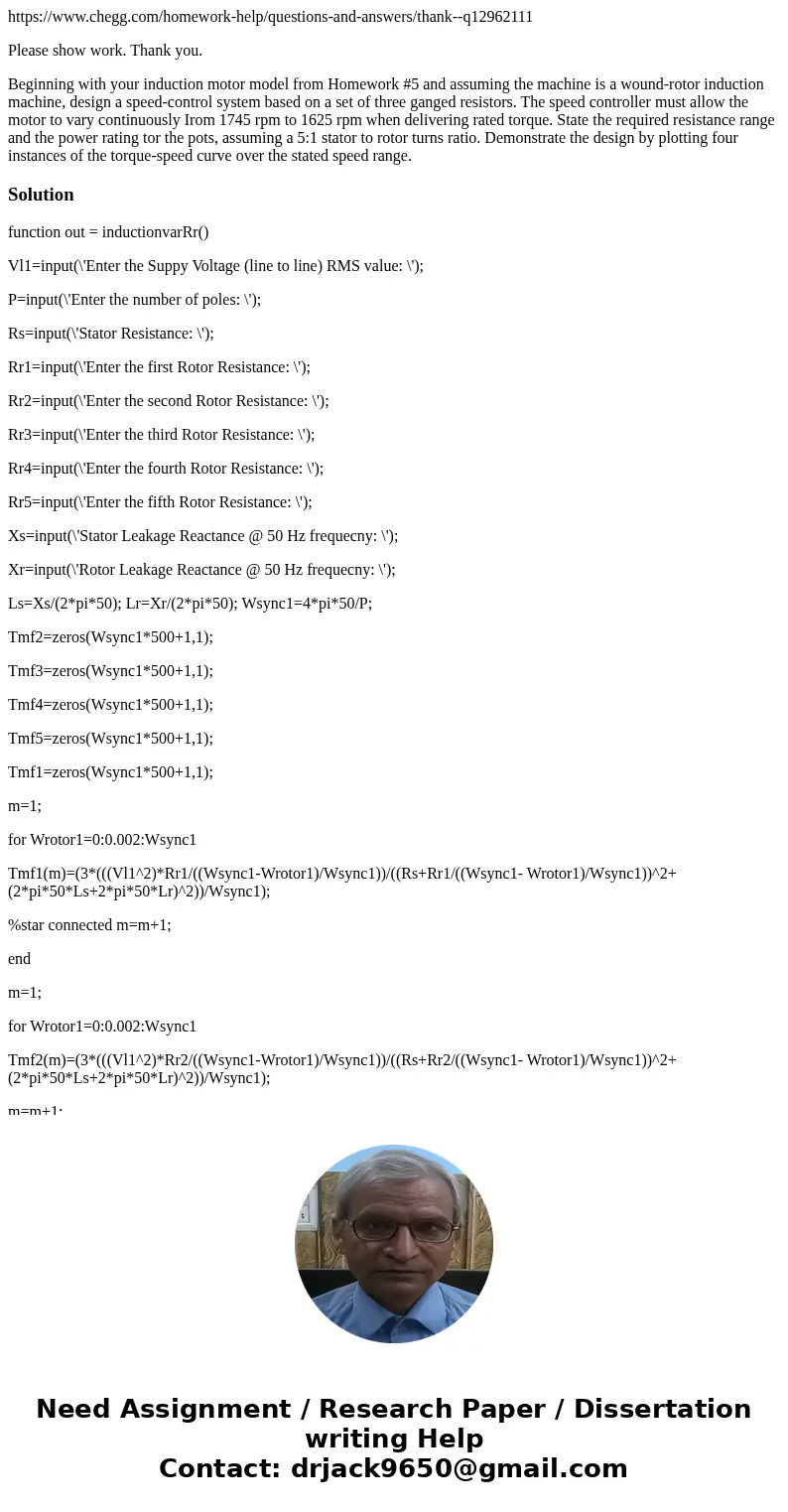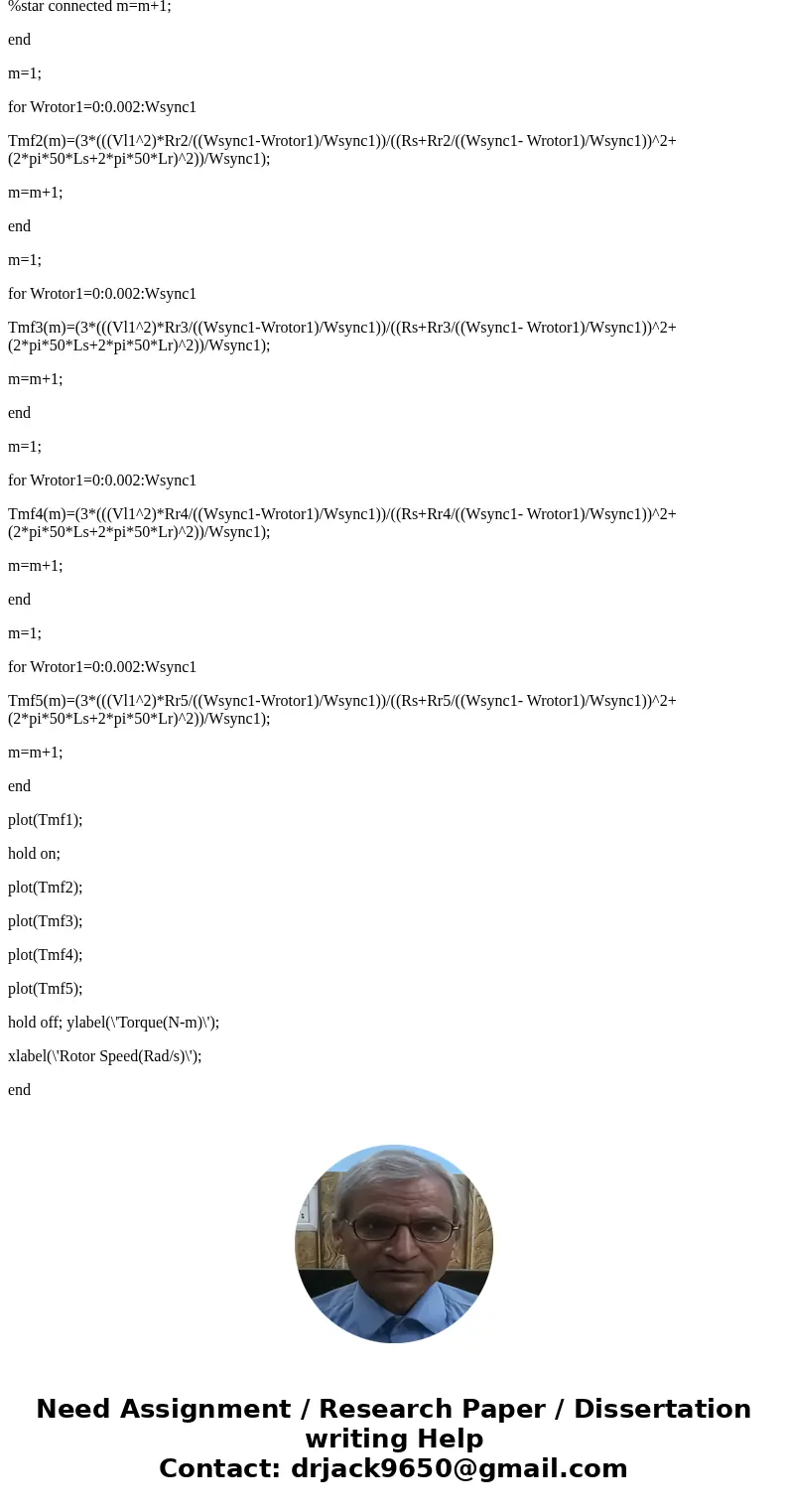httpswwwcheggcomhomeworkhelpquestionsandanswersthankq1296211
https://www.chegg.com/homework-help/questions-and-answers/thank--q12962111
Please show work. Thank you.
Beginning with your induction motor model from Homework #5 and assuming the machine is a wound-rotor induction machine, design a speed-control system based on a set of three ganged resistors. The speed controller must allow the motor to vary continuously Irom 1745 rpm to 1625 rpm when delivering rated torque. State the required resistance range and the power rating tor the pots, assuming a 5:1 stator to rotor turns ratio. Demonstrate the design by plotting four instances of the torque-speed curve over the stated speed range.Solution
function out = inductionvarRr()
Vl1=input(\'Enter the Suppy Voltage (line to line) RMS value: \');
P=input(\'Enter the number of poles: \');
Rs=input(\'Stator Resistance: \');
Rr1=input(\'Enter the first Rotor Resistance: \');
Rr2=input(\'Enter the second Rotor Resistance: \');
Rr3=input(\'Enter the third Rotor Resistance: \');
Rr4=input(\'Enter the fourth Rotor Resistance: \');
Rr5=input(\'Enter the fifth Rotor Resistance: \');
Xs=input(\'Stator Leakage Reactance @ 50 Hz frequecny: \');
Xr=input(\'Rotor Leakage Reactance @ 50 Hz frequecny: \');
Ls=Xs/(2*pi*50); Lr=Xr/(2*pi*50); Wsync1=4*pi*50/P;
Tmf2=zeros(Wsync1*500+1,1);
Tmf3=zeros(Wsync1*500+1,1);
Tmf4=zeros(Wsync1*500+1,1);
Tmf5=zeros(Wsync1*500+1,1);
Tmf1=zeros(Wsync1*500+1,1);
m=1;
for Wrotor1=0:0.002:Wsync1
Tmf1(m)=(3*(((Vl1^2)*Rr1/((Wsync1-Wrotor1)/Wsync1))/((Rs+Rr1/((Wsync1- Wrotor1)/Wsync1))^2+(2*pi*50*Ls+2*pi*50*Lr)^2))/Wsync1);
%star connected m=m+1;
end
m=1;
for Wrotor1=0:0.002:Wsync1
Tmf2(m)=(3*(((Vl1^2)*Rr2/((Wsync1-Wrotor1)/Wsync1))/((Rs+Rr2/((Wsync1- Wrotor1)/Wsync1))^2+(2*pi*50*Ls+2*pi*50*Lr)^2))/Wsync1);
m=m+1;
end
m=1;
for Wrotor1=0:0.002:Wsync1
Tmf3(m)=(3*(((Vl1^2)*Rr3/((Wsync1-Wrotor1)/Wsync1))/((Rs+Rr3/((Wsync1- Wrotor1)/Wsync1))^2+(2*pi*50*Ls+2*pi*50*Lr)^2))/Wsync1);
m=m+1;
end
m=1;
for Wrotor1=0:0.002:Wsync1
Tmf4(m)=(3*(((Vl1^2)*Rr4/((Wsync1-Wrotor1)/Wsync1))/((Rs+Rr4/((Wsync1- Wrotor1)/Wsync1))^2+(2*pi*50*Ls+2*pi*50*Lr)^2))/Wsync1);
m=m+1;
end
m=1;
for Wrotor1=0:0.002:Wsync1
Tmf5(m)=(3*(((Vl1^2)*Rr5/((Wsync1-Wrotor1)/Wsync1))/((Rs+Rr5/((Wsync1- Wrotor1)/Wsync1))^2+(2*pi*50*Ls+2*pi*50*Lr)^2))/Wsync1);
m=m+1;
end
plot(Tmf1);
hold on;
plot(Tmf2);
plot(Tmf3);
plot(Tmf4);
plot(Tmf5);
hold off; ylabel(\'Torque(N-m)\');
xlabel(\'Rotor Speed(Rad/s)\');
end


 Homework Sourse
Homework Sourse